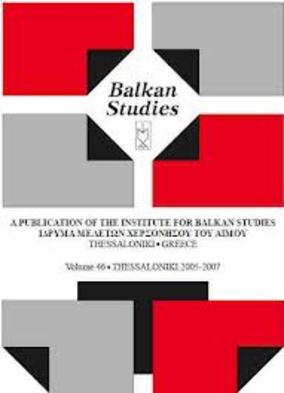Human liberties in the pre-revolutionary Greek community system
Part of : Balkan studies : biannual publication of the Institute for Balkan Studies ; Vol.30, No.1, 1989, pages 5-32
Issue:
Pages:
5-32
Section Title:
Articles
Author:
Abstract:
On the occasion of the second centenary of the French Revolution, itis interesting to examine how far its declarations affected Greeks, in view ofthe fact that human liberties—or those which we usually refer to as civilrights—were born in Greece itself, a country which, at the end of the eighteenthcentury, was groaning beneath the boot-heel of the Ottoman conqueror.One precondition of the exercise of human liberties is the possibility ofbelonging to a group on an individual or a collective basis. This right wasrecognised for the first time in the history of European civilisation by Solon,whose legislation extended it—originally the exclusive prerogative of theeupatrides (who were bound by common blood into phratries)—to otherclasses of free individuals, who were connected by bonds of common space(demes) and common interests (orgeones, thiasi, and sailors).It was thus that the beginning of the sixth century saw the establishmentof the polity of conciliation, whose concensus processes made the conceptof Democracy a reality; for every citizen had access to the public offices, andthus felt himself to be an organic part of the city-state.Since then human liberties have been in both theory and practice inseparablybound up with the democratic system. And when it declines or disappears,they suffer.Turning our investigation to the period of Turkish domination, we realisethat even at this time of oppression, on the basis of the traditional commonlaw of the privilege system, favourable conditions had been created for thedevelopment of human liberties. Each community was an autonomous taxationunit operating on the basis of the mutual interests of the conquerorsand the conquered. Being jointly responsible for the payment of taxes, themembers of each community soon developed systems of mutual dependencyand self-administration, by which every member, in accordance with therepresentative system, had access to the governing processes of the communities as subsidiary power centres. He could be elected to community offices,elect those who handled the taxes, and above all check up on them, both inthe exercise of their duties and, above all, when their year of service ended.Evidence from Serres (1614), Mykonos (1615 and 1659), Smyrna (1785),Hydra (1804-18), and Meleniko (1813), reveals that the enslaved rayahs hadbegun to enjoy civil rights in the form I have described, some 200 years beforethe French Revolution; yet in the Venetian dominated Ionian Islands, despitetheir direct contact with the West, only the nobility had civil rights before thenineteenth century.On the basis of the community experience in the period of Turkishdomination, Rhigas Velestinlis came out firmly in favour of the declarationsof the French Revolution. In his Constitution (1797), however, he surpassedthem, for he accorded civil rights not only to individuals but also to groups,irrespective of racial, religious, or linguistic criteria. He thus anticipatedarticles 22, 23, and 27 of the Universal Declaration of Human Rights, which,like Rhigas, grant civil liberties to societies and communities.
Subject:
Subject (LC):




